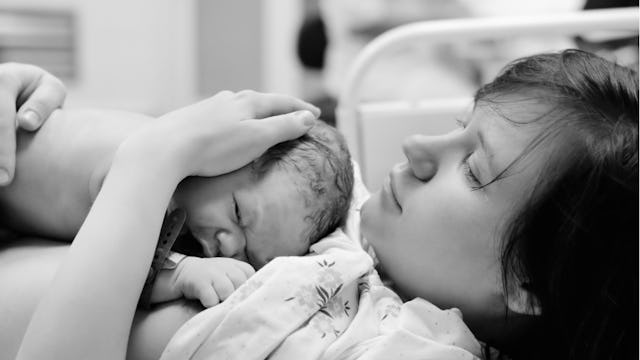No One Is Paying Attention To Mothers After Childbirth And They're Dying

After delivery, mothers need to be just as well cared for as their babies
When a mother is in the hospital after giving birth to her new bundle of joy, that little human is well cared for — as it should be. In preparation for discharge, mothers are given a mountain of pamphlets with instructions on how to notice any potential problems with the health and wellness of their baby. Everyone is so focused on the baby that mothers often get lost in the discharge process, which isn’t just sad, it’s actually deadly.
“Every single nurse, pediatrician, and lactation consultant dismissed my concerns as hormones and anxiety,” Emily McLaughlin says in an NPR article published this week titled, ”If You Hemorrhage, Don’t Clean Up’: Advice From Mothers Who Almost Died.” She suffered a stroke and other complications after giving birth in Connecticut in 2015.
Another mother, Marie McCausland, described her childbirth discharge materials as vague, confusing, and “really quite useless,” in the same article. She suffered from preeclampsia and had to go to two hospitals before being taken seriously … before being treated. Both women are lucky to be alive.
Their stories, along with over 3,000 others are part of an investigation by NPR and Propublica, into the staggering U.S. maternal death rates. The results are jarring: “More American women are dying of pregnancy-related complications than any other developed country. Only in the U.S. has the rate of women who die been rising.” These women aren’t just dying in the hospital during or immediately after childbirth. About 60 percent of maternal deaths occured six weeks or more after delivery, according to the data.
The most disturbing and common themes found in these latest survivor recollections are that the new moms lacked critical information and their symptoms were dismissed. Many of these women weren’t talked to after their delivery by a doctor or qualified medical professional, nor were they given discharge instructions for their own healing. They were not given information or literature with warning signs of possible postpartum complications. They knew nothing or little to nothing about the complications that nearly killed them. Additionally, their complaints or concerns were not taken seriously.
Undoubtedly, the responsibility falls on the medical establishment to make improvements, but there are warnings and tips you can be armed with. After all, knowledge is power and you can be your best advocate in emergency situations too.
The March of Dimes website has a great list of warning signs to watch out for after childbirth (which include physical and mental tips):
- Bleeding that’s heavier than your normal menstrual period or that gets worse
- Discharge, pain or redness that doesn’t go away or gets worse. These could be from a c-section incision (cut), episiotomy or perineal tear (a tear that happens between the vagina and rectum).
- Feelings of sadness that last longer than 10 days after giving birth
- Fever higher than 100.4 F
- Pain or burning when you go to the bathroom
- Pain, swelling and tenderness in your legs, especially around your calves
- Red streaks on your breasts or painful lumps in your breast
- Severe pain in your lower belly, feeling sick to your stomach or throwing up
- Vaginal discharge that smells bad
Additionally, you’ve probably heard of preeclampsia, a serious condition that is marked by high blood pressure during pregnancy. But many people aren’t aware that preeclampsia can also occur after you’ve had your baby – even if you’ve never been diagnosed with it before. A new case of it could literally just crop up in an otherwise healthy individual following delivery. While postpartum preeclampsia is rare, it is life-threatening so it’s best to be aware of those warning signs too. According to the Mayo Clinic new moms should also watch out for:
- High blood pressure (hypertension) — 140/90 millimeters of mercury (mm Hg) or greater
- Excess protein in your urine (proteinuria)
- Severe headaches
- Changes in vision, including temporary loss of vision, blurred vision or light sensitivity
- Swelling of the face and limbs
- Upper abdominal pain, usually under the ribs on the right side
- Nausea or vomiting
- Decreased urination
- Sudden weight gain, typically more than 2 pounds (0.9 kilogram) a week
One mother in NPR’s survivor stories recommended that moms take their own blood pressure at home if they can. If you notice any of the above symptoms it’s best to call your doctor right away or go to your nearest emergency room.
Ultimately, it all comes down to this: mothers who’ve gone through childbirth deserve to be focused on and cared for in the same way their babies are. Our lack of care for mothers is a symptom we can’t ignore any longer.
This article was originally published on